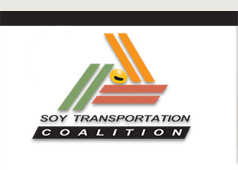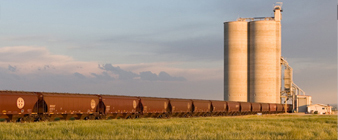 |
 |
|
| eNews • November 2014 | ||
| Promoting a Cost-Effective, Reliable and Competitive Transportation System |
||
 STC to monitor rail service for 2014 harvest
STC to monitor rail service for 2014 harvest
The Soy Transportation Coalition (STC) is working with the University of Minnesota and Informa Economics on a research project, ââ¬Å"2014 Harvest: Attaching a Garden Hose to a Fire Hydrant.ââ¬Â While transportation concerns for the 2014 harvest are evident throughout the country, a particular region - North Dakota, South Dakota, Minnesota, and Nebraska - is experiencing particular hardship due to having more limited access to alternative transportation providers and modes. Most of these areas solely rely on freight rail. As a result, the supply/demand transportation imbalance may have a more punitive effect on agriculture and individual farmers in these regions than other areas of the country.
The Soy Transportation Coalition will monitor and document rail service for the 2014 harvest in areas of North Dakota, South Dakota, Minnesota, and Nebraska and identify the impact of the service on the profitability of each stateââ¬â¢s agricultural industry and individual farmers. The STC also will be exploring potential harvest season exemptions - particularly for trucking - that, if instituted could eliminate a portion of the pressure that may build due to rail service challenges.
A component of the research will be a bi-weekly survey of grain receiving locations in these states. The surveys will commence in early November and extend through February of 2015. The survey will focus on whether rail service is reliable or challenging, how rail service is impacting storage capacity at grain handling locations, and what corresponding effect, if any, will rail service present to farmer profitability in the surveyed regions.
ââ¬Å"The decline in rail service for the 2013 harvest imposed substantial hardship on a large portion of Americaââ¬â¢s farmers,ââ¬Â explains Mike Steenhoek, executive director of the Soy Transportation Coalition. ââ¬Å"Many farmers have expressed how unreliable rail service reduced their income last year by $20,000, $50,000, $100,000, and beyond. A similar potential exists for the 2014 harvest. This is a vivid example of how transportation is not a theoretical issue for farmers, it is a tangible one. It is therefore essential for an organization like the Soy Transportation Coalition to be actively engaged in this issue to help ensure farmers receive rail service that will enable them to be profitable.ââ¬Â
Soy Transportation Coalition |
|
